
|
Sale 86
The Manuscripts, Collectibles & Space Auction
| The William K. Steiner Collection - U.S. Civil War |
| |
| |
| Lot |
Photo |
Description |
Realized |
Lot 304 |
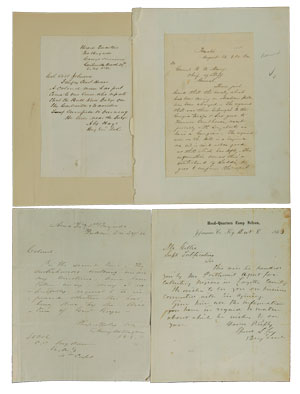 |
[African Americans in the Civil War] The Union and "Contraband". Four autograph letters signed by four Union generals: Alfred Pleasonton ALS ("A. Pleasanton") as Brig. Gen. Com'dy, 2 pages, 8 x 5 in., tipped to a larger sheet, Haxall's, Aug. 13 (1862), to Gen. r.B. Marcy: "I have just herd that the cavalary which has been serving on malvern Hill has been changed. The regiment that was thre belonged to the Georgia troops & has gone to Hanover Courthouse, most probably with Longstreet….The regiment now on the Hill is a Virginia one….This information comes thro' a contraband of Ladd's….It is said the rebels have moved a considerable force to Hanover…it shows they are uneasy for Jackson's rear from this army. This also comes thro' contraband." Henry M. Naglee, ALS as Brig. Gen., 1 page, 9¾ x 7¾ in., Head Qrs 1st Brigade, Yorktown, Dec. 24, 1862, to Lt. Col. C.C. Suydam: " For the second time, the contrabands working under my directions have been taken away. May I respectfully request to be informed whether this has been done by the direction of Genl. Keyes." Endorsed on verso by Suydam and Naglee, who noted, "some 20 - which were under Capt Davis… [doing] the most important work to be done." Alexander Hays ALS ("Alex Hays"), 1 page, 8 x 5 in., Head-Quarters, 3rd Brigade, Caseys Division, Centreville (Va.), to Col. Robert Johnson at Fairfax Court House: "A colored man has just come to our lines, who reports that the Bull Run bridge on the Centreville & Warrenton Turnpike is burning. He lives near the bridge." Speed Smith Fry ALS ("Speed S Fry/Brig Genl."), 1 page, 9¾ x 8 in., on Head-Quarters Camp Nelson letterhead, Jassamine Co. Ky, Dec. 8, 1863, to Mr. Gillis, Supt. Fortifications: "Sir This will be handed you by Mr. Postlewait agent for collecting negroes in Fayette County. He wishes to see you on business connected with his Agency. Give him all the information you have in regard to matters about which he wishes to see you."
"Contraband of war" was a term used for runaway slaves who flocked to Union army camps for refuge. The escaped slaves were not returned to their "masters," although they were not considered free until the Emancipation Proclamation of 1863 was issued. The US Congress passed the Confiscation Act of 1861, which declared that any property used by the Confederate military, including slaves, could be confiscated by Union forces. In March 1862 Congress passed its Act Prohibiting the Return of Slaves, which forbade returning slaves to Confederate masters or to the military. Some 100 "contraband" camps were set up across the South, including near the White House. President Lincoln was known to visit a contraband camp which was located between the White House and the Cottage at the Soldiers' Home, where he spent a great deal of time; in fact, the President and Mrs. Lincoln, along with a few guests, visited the camp to hear songs that the residents had prepared for them. From July 17, 1862, African Americans were permitted to enlist in the Union Army, and many of the escaped slaves did. Others acted as effective spies for the North, as noted in these letters.
Estimated Value $2,000 - 3,000.
Christie's New York, June 9, 2004, lot 233.
View details and enlarged photo
| Realized
$1,170 |
Lot 305 |
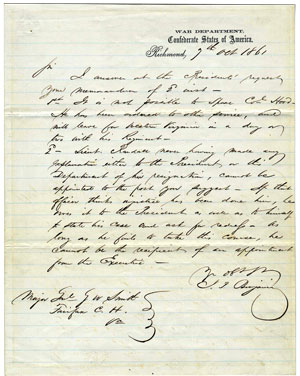 |
Benjamin, Judah P. War-date autograph letter signed ("J.P. Benjamin"), 1 page, 10 x 8 in., Richmond, Oct. 7, 1861, as Confederate Secretary of War on imprinted "War Department/ Confederate Confederate States of America" stationery. To Major General Gustavus W. Smith, refusing two requests. In full, "Sir, I answer at the President's request your memorandum of 2nd inst- 1st, It is not possible to spare Col. [John Bell] Hood- He has been ordered to other service, and will leave for Western Virginia in a day or two with his Regiment. 2nd, Lieut. [Horace] Randall never having made any explanation either to the president or this Department of his resignation, cannot be appointed to the post you suggest. If that officer thinks injustice has been done him, he owes it to the President as well as to himself to state his case and ask for redress. As long as he fails to take this course, he cannot be the recipient of an appointment from the Executive. Yr obt St, J.P.Benjamin." In excellent condition.
Judah Benjamin (1811-1884) had served as U.S. senator from Louisiana (1853-1861) before the war. He was the highest ranking Jewish Confederate Cabinet member. He served as Attorney General, Secretary of War, and Secretary of State. Speaking both French and Yiddish, he secured a three million dollar loan from the French Jewish bankers. After the fall of the Confederacy, Benjamin escaped to England where he became head of the British bar, the only American to hold that title. He also authored a book on torts which is still in use today. Benjamin married a Catholic woman, Natalie Bauche de St. Martin, in 1833; she lived most of the time after their marriage in Paris. Benjamin is buried in the St. Martin family crypt in the Catholic Pere Lachaise Cemetary.
Gustavus Smith (1821-1896) was commissioned Major General (Sept.19, 1861) just prior to the writing of this letter. He commanded a wing of the Army of Northern Virginia during the Peninsular Campaign; he also commanded at Seven Pines, after General Joe Johnstron was wounded. John Bell Hood (1831-1879) was commissioned Major General (Oct10, 1861). He served as a division commander under General Longstreet, distinguished himself at Sharpsburg and Fredericksburg; he was wounded in the arm at Gettysburg, and lost a leg at Chicamauga.
Estimated Value $1,200 - 1,500.
View details and enlarged photo
| Realized
$4,080 |
Lot 306 |
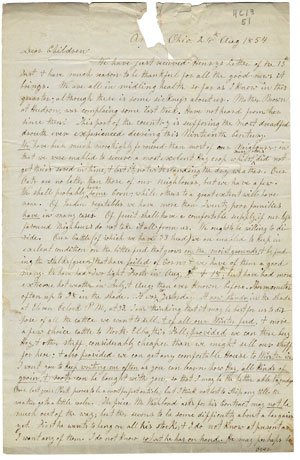 |
Brown, John (1800-1859) Militant abolitionist who seized the federal complex at Harper's Ferry on October 16, 1859, hoping to instigate a major slave rebellion in the South. Troops under the command of Lt. Col. Robert E. Lee were sent from Washington to arrest Brown. They stormed the engine house, captured him and his small group of men, and turned them over to Virginia authorities to be tried for treason. He was quickly tried and sentenced to hang on December 2.
Autograph letter signed, 1½ pages, 12½ x 8 in., Ohio, Aug 24, 1854. To his children. With integral leaf addressed to Henry Thompson, North Elba, Essex Co, New York, with black Ohio postmark and matching "Paid 3". Extremely long letter during the period Brown and his partner Perkins nearly broke even, despite the mention of severe drought in this letter. He exaggerates his successes: "…We have been much more highly favored than most of our neighbors in that we were enabled to secure a most excellent hay crop whilst many others did not get theirs saved in time, & lost it notwithstanding the dry weather. Our oats are no better than those of our neighbors…We shall probably have some corn while others to a great extent will have none. Of garden vegetables we have more than twenty poor families have in many cases. Of fruit shall have a comfortable supply, if our less favoured neighbors do not take it from us. Our cattle, of which we have 33 head we are enabled to keep in excellent condition on the little feed that grows on the moist grounds, & by feeding the stalks (green) that have failed of corn; & we have of them a good many…" An unusually long letter
Brown is writing to his children who are living on land he purchased in upstate New York. After he was executed for his capture of the armory at Harper's Ferry, his wife took his body there for burial.
Estimated Value $6,000 - 8,000.
Christie's New York, Oct. 8, 1996, lot 185.
View details and enlarged photos
| Realized
$3,720 |
Lot 307 |
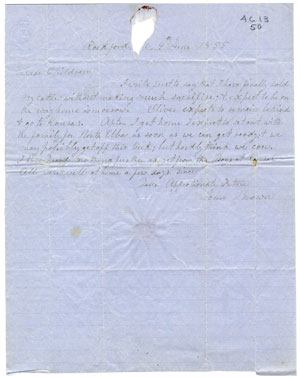 |
Brown, John. Autograph letter signed ("John Brown"), 1 page, 10 x 8 in., Rockford, Ill., June 4, 1855.; small piece missing at top. With original leaf addressed in his hand to "Mr. Henry Thompson, North Elba, Essex Co, New York" bearing a black circular "Rockford, June 3, Ill" date stamp and a matching fancy "Paid 3". To his children: " Dear Children, I write just to say I have finally sold my cattle without risking much sacrifice & expect to remain behind & go to Kansas. After I get home I expect to set out with the family for North Elba as soon as we can get ready; yet we may possibly get off this week; but hardly think we can. I have heard nothing yet from the Boys at Kansas. All were well at home a few days since. Your affectionate father, John Brown".
Brown did indeed return to Kansas where less than a year later he led a raid killing five pro-slavery southerners which became known as the "Pottawatomie Massacre," a most significant event during the years of "Bleeding Kansas" that defined Brown's ideology.
Estimated Value $2,000 - 3,000.
Christies Oct. 8, 1996, lot 483.
View details and enlarged photos
| Realized
$1,320 |
Lot 308 |
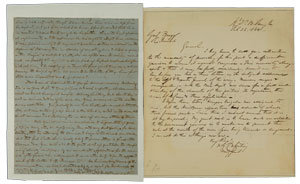 |
C.S.A. Generals William Henry Chase Whiting & William Nelson Pendleton. Whiting ALS ("W.H.C. Whiting") as Major General, 1 page, 10 1/8 x 9¼ in., laid to a slightly larger sheet. Headquarters, Wilmington (NC), Feb. 28, 1864. To General Bragg, at Richmond: "I beg leave to call your attention to the necesity [sic] of providing for this post a sufficient garrison to ensure it against surprise….permit me to lay before you two or three letters on the subject addressed to the Adjt. Inspector General of the army…maps & correspondence with the war dept will serve for a full understanding of the character of this position, its importance, the means of defense & their application….Kemper's brigade was assigned to me…I am not sure that it is at my disposal. My great need is to have such an addition to the permanent garrison…." Whiting (1824-1865) had been promoted to Major General on February 13, 1863 and was assigned command of the Department of North Carolina and Southern Virginia, briefly taking over the Petersburg Defenses in May 1864. He was wounded in the right thigh and hip and captured in the Second Battle of Fort Fisher (Jan. 1865). Angry that General Bragg failed to use the division of Maj. Gen. Robert Hoke to attack the Federal rear while the fort was under assault, Whiting requested an investigation of Bragg's actions from his prison cell. He died of dysentery, which entered his wounds, on March 10, 1865.
Pendleton ALS ("W.N. Pendleton"), 2 pages (one sheet), inlaid, 10 x 8 in., inlaid to a slightly larger sheet and silked on verso, "Hd Qrs, Arty. Corps near Petersburg Va." To Gen. G.T. Beauregard: "In consequence of a conversation which Genl Lee held with me this afternoon I take the liberty…of submitting to you an unofficial suggestion….Genl Lee expressed to me his perplexity respecting a reliable commander for Wilmington, it being notorious that Genl Whiting does not enjoy the confidence of the army or country, and for reasons, too, which render it extremely unsafe for an important point to defend, at a critical time, upon his efficiency. Believing that under the pressure which we must expect this fall & winter, & next spring, your own services will be required in a more extended sphere, I expressed to Genl Lee my conviction that his own eldest son, Genl Custis Lee, would make an admirable commander….the Genl seemed to judge…that Genl Custis has the requisite qualities…but he replied…that Custis being his son he could not recommend him nor could he propose, as he is the President's aid, that such special personal relations should be relinguished. He also urges that Custis had not had sufficient experience in the war to entitle him to entire confidence in so responsible a position…." Pendleton expounds at length on why he thinks Custis Lee should replace Gen. Whiting and hopes that Beauregard, as the commanding officer in the department, concurs. He adds, "No human being knows of this communication. And it is dictated solely by a regard for the success of our cause…." Letter is trimmed closely on verso under the signature, affecting a few words below and in the first line of text on verso.
Estimated Value $1,000 - 1,500.
Christie's, New York, June 9, 2004, lot 311.
View details and enlarged photo
| Realized
$2,760 |
Lot 309 |
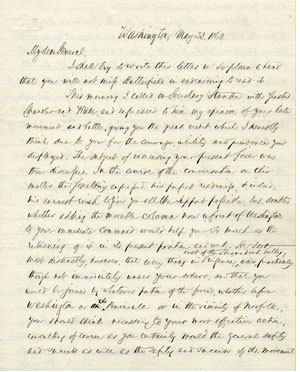 |
Chase, Salmon P (1808-1873) American statesman who served as U.S. Senator from Ohio, 23rd Governor of Ohio, U.S. Treasury Secretary under Lincoln, and sixth Chief Justice of the United States. Civil War-date autograph letter signed ("S.P. Chase"), as Treasury Secretary, 3 pages, Washington, May 23 1863. To General Joseph E. Hooker, who had replaced Burnside as commander of the Army of the Potomac on January 28, informing him about private meetings with Secretary of War Edwin Stanton and President Lincoln and suggesting how to demand more troops.
In part: "…This morning I called on Secretary Stanton…and expressed to him my opinion of your late movement and battle, giving you the great credit which I honestly think due to you….the Secretary expressed his perfect readiness, & indeed, his earnest wish to give you all the support possible., but doubted whether adding the movable column now in front of Washington to your immediate command would help you….He said most distinctly, however, that every thing in Virginia, east of the Shenandoah Valley, was, practically though not immediately under your orders….After leaving Mr. Stanton I saw the President….while he seemed to feel the necessity of doing whatever you might desire, to strengthen you, he expressed some apprehension…other important points might be too much weakened. He evidently regarded everything as left pretty much to your discretion….the result of both interviews satisfied me that three courses are open to you; first, to remain in action where you are until reinforced from the draft, if ever; secondly to fight with the troops you have & at once; thirdly, to call earnestly & positively for the additional…thirty thousand men needed for the movement, you described as possible…."
Chase advises Hooker to follow the third course and gives details on exactly how he should go about it, then tells him to pardon the letter and to follow his own better judgment. Minor edge splits at folds.
However euphemistically Chase described Hooker's efforts in the recent battle (May 2-4 at Chancellorsville), Hooker had suffered a decisive defeat at the hand of Robert E. Lee. Lincoln's search for an effective commander was once again frustrated, and in the summer of 1863, Hooker was replaced with George Meade.
Estimated Value $1,200 - 1,500.
Christie's New York, June 9, 2004, lot 245.
View details and enlarged photos
| Realized
$3,120 |
Lot 310 |
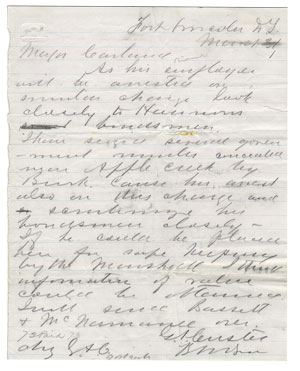 |
Custer, George Armstrong (1839-1876) United States Army officer and cavalry commander in the American Civil War and the American Indian Wars. On June 25, 1876, he led 210 men of the 7th Cavalry into battle at Little Bighorn against Lakota and Cheyenne warriors. Custer and all of his men were killed in the battle.
Autograph letter signed ("G A Custer/ BtMgen") and initialed ("GAC") in pencil, 1 page, 9¾ x 7¾ in., on a leaf of blue ruled machine-laid paper, "Fort [Abraham] Lincoln, D[akota] T[erritory]", March 31 (probably 1875). To Major [John] Carland, a close military acquaintance of Custer serving under General Alfred Terry's command of the 6th Infantry at the time of the massacre at Little Big Horn. Custer vowed to root out all thefts of military goods. Here he orders Major Carland to arrest a man named Hannons "as his employer will be arrested on a similar charge…I have seized several government missiles concealed near Apple Creek by Bis[ma]rk. Cause his arrest also on this charge." He speculates that if the man sought by Carland "could be placed here [Bismarck] for safe keeping by the Marshall I think information of value could be obtained." Small stains and soiling; pinholes at horizontal folds.
Custer was said to have told Carland that he did not want the support of the 2nd Cavalry and Gatling guns at Little Big Horn as he wanted "all the glory for the 7th". On the day of the massacre, Carland saw smoke coming from the battlefield and thought Custer was victorious. He and General Terry discovered Custer's body on the battlefield. A very important Custer association letter.
Reference: cf. Whitaker, A Complete Life of General George A. Custer (1876), pp 523-524.
Estimated Value $5,000 - 7,000.
Sotheby's, November 1, 1993, lot 43.
View details and enlarged photo
| Realized
$3,600 |
Lot 311 |
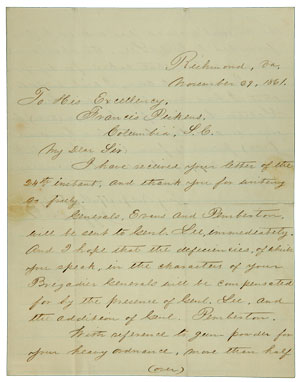 |
Davis, Jefferson (1808-1889) President of the Confederate States of America (1861-1865). Important-content, war-date letter signed ("Jeffn. Davis") as President-elect of the CSA, 2 pages, Richmond, Nov. 29, 1861. To South Carolina Governor Francis Pickens, agreeing to send reinforcements to General Lee. In part: "Generals, Evans and Pemberton, will be sent to Genl. Lee, immediately. And I hope that the deficiencies of your Brigadier Generals will be compensated for by the presence of Genl. Lee, and the addition of Genl. Pemberton. With reference to gun-powder for your heavy ordnance, more than half the amount received was ordered to be furnished to Genl. Lee, the whole amount being less than that asked for by you. In regard to arms, I wish, indeed, that I had more to give you. Governor Letcher [of Virginia] has now five hundred (500) for you, in addition to the five hundred (500) previously furnished. This is but a small supply, but will be increased as fast as our means will admit." Davis adds a holograph closing, "Very respectfully & truly yrs." Accompanied by a jumbo postcard with a Brady photo of Davis.
Davis served as provisional president from February 1861 until his election to a six-year term on November 6, 1861, just over three weeks before he wrote this letter. His inauguration took place on February 22, 1862.
Francis Pickens (1805-1869) was Governor of South Carolina when that state became the first to secede from the U.S.A.
Estimated Value $5,000 - 6,000.
Christie's New York, Dec 5, 1997, lot 32.
View details and enlarged photos
| Realized
$4,320 |
Lot 312 |
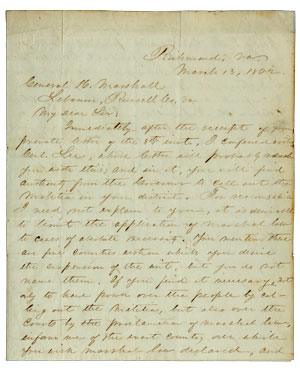 |
Davis, Jefferson. War-date autograph letter signed ("Jeffn. Davis") as CSA President, 2½ pages, Richmond, March 13, 1862. To General H[umphrey] Marshall, who commanded the Army of Eastern Kentucky: "Immediately after the receipt of your private letter…I conferred with Genl. Lee, whose letter will probably reach you with this; and in it, you will find authority from the Governor to call out the militia in your district. For reasons which I need not explain to you, it is desirable to limit the application of marshal law to cases of absolute necessity….If you find it necessary, not only to have power over the people by calling out the militia, but also over the courts by proclamation of marshal law, inform me of the exact county over which you wish marshal law declared, and I will send you the requisite authority. Genl. E.K. Smith will probably have, in a short time, a strong force at Cumberland Gap; and if the enemy should not press him there, it may be in his power to cooperate with you in overthrowing the column at Pikesville. I concur fully in your view of the propriety of advancing into Ky., and only regret that I can not at once furnish you with the requisite force for the execution of your design. I know how fully your heart is in the cause in which we are embarked, and hope that day may not be distant when you will be possessed of the means to carry the 'States Rights' flag over the soil of your birth, and there vindicate the sovereignty of Ky. We are sorely pressed, just now, on every side; but the good and true men, who have engaged in the war, seem only with redoubled energy to bear up against increasing burden. What we may bear of sacrifice, how long we may be required to bear it, is problematical; but no one doubts, or seems to doubt, the final success of our holy cause…." Some overall soiling.
Together with an envelope free franked ("Jeffn. Davis U.S.S.") as a senator from Missisisippi, Jan. 1, 1852. In 1853, Davis would be appointed Secretary of War under Franklin Pierce and would build up the U.S. fighting forces which he would have to contend with as President of the CSA.
Estimated Value $3,500 - 4,500.
Sotheby's, Sale 7240, lot 28.
View details and enlarged photos
| Realized
$5,280 |
Lot 313 |
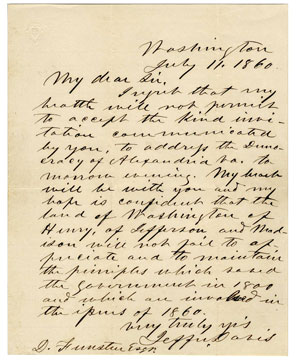 |
Davis, Jefferson. Autograph letter signed, 1page, 8 x 6½ in., Washington, July 11, 1860. To D. Funsten, Esqr. As a U.S. Senator from Mississippi. Davis was to resign in less than seven months upon the secession of his home state and become President of the Confederacy. He writes with a veiled reference to his pro-slavery beliefs, declining an invitation to "address the Democracy of Alexandria Va. tomorrow evening. My heart will be with you and my hope is confident that the land of Washington of Henry, of Jefferson and Madison will not fail to appreciate and maintain the principles which saved the Government in 1800 and which are involved in the issues of 1860. Very truly yours, Jefferson Davis."
David Funsten (1819-1866) was from Clarke County, Virginia. He served in the Virginia House of Delegates in 1844 and 1845. He served in the Confederate Army and was elected to the First Confederate Congress in a special election to replace William "Extra Billy" Smith, who had resigned to return to his regiment. In the November 1863 election for the Second Confederate Congress, Funsten was also selected. Because of the end of the war, the Confederate Congress did not serve its full two-year term. Its final session took place on March 18, 1865. One of its final acts was the passage of a law allowing for the emancipation and military induction of any slave willing to fight for the Confederacy, a notion put forward by General Patrick Cleburn (killed at the Battle of Franklin on Nov. 30, 1864) a year earlier.
Estimated Value $3,500 - 4,500.
View details and enlarged photo
| Realized
$4,200 |
Lot 314 |
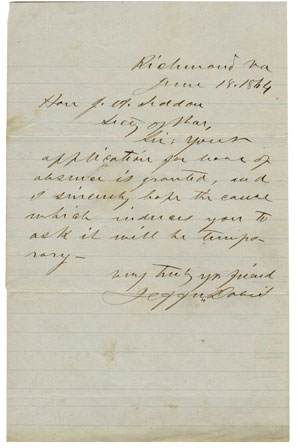 |
Davis, Jefferson. War-date autograph letter signed ("Jeffn. Davis") as CSA President, one page, on blue, lined paper, 7¾ x 5 in., Richmond, June 18, 1864. To CSA Secretary of War James A. Seddon: "Your application for leave of absence is granted, and I sincerely hope the cause which induces you to ask it will be temporary." Seddons (1815-1880) served as a Virginia representative until ill health forced his retirement in 1851. He attended the peace convention held in Washington, D.C. in 1861, which attempted to come up with a means of preventing the impending civil war, and later in 1861, he attended the Provisional Confederate Congress. He was the fourth person named to the post of CSA Secretary of War and the longest-serving in that position. He resigned in January 1865, and was replaced by John C. Breckinridge.
Estimated Value $2,500 - 3,500.
Sotheby's New York, Nov. 25, 1997, lot 235.
View details and enlarged photo
| Realized
$2,220 |
Lot 315 |
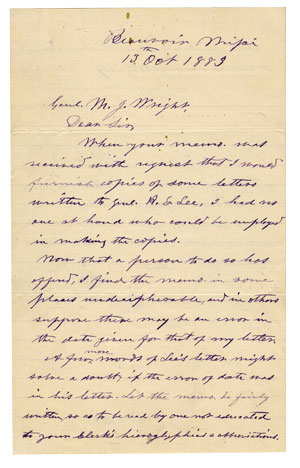 |
Davis, Jefferson. Letter written in the hand of Varina Davis and signed twice by Jefferson Davis, once at the end of the letter ("Jefferson Davis") and once after the postscript ("Yours, J.D."), 2 pages, 8 x 5 in., Beauvoir, Mississipi, Oct. 13, 1883. To Confederate General Marcus J. Wright, who had requested copies of some letters Davis had written to Robert E. Lee, regretting that he had no one earlier to make copies but now someone had offered to do so. "…I find the memo in some places undecipherable, and in others suppose these may be an error in the date….A few more words of Lee's letter might solve a doubt….Let the memo, be fairly written, so as to be read by one not educated to your Clerk's hieroglyphics…." In a postscript, Davis asks, "Can you give me a copy of a letter from Genl. R.E. Lee, to which I sent a telegraphic reply Aug. 10, 1864. The letter was probably written a very short time before the date of the reply, which indicates that the subject was the appointment of a commander for the cavalry in So. West. Va. Yours, J.D." Lee's name is mentioned a total of three times.
Marcus J. Wright (1831-1922) was a Brig. Gen. in Cheatham's Division. After the war, he was one of the foremost writers of the Confederate side of the war and contributed fifty sketches of Southern commanders to Appleton's. He prepared Memoirs of Robert E. Lee with Gen. A.L. Long and wrote other books dealing with U.S. military history. From 1878 he was an agent for the War Department for the collection of military papers.
Estimated Value $750 - 1,000.
View details and enlarged photos
| Realized
$960 |
Lot 316 |
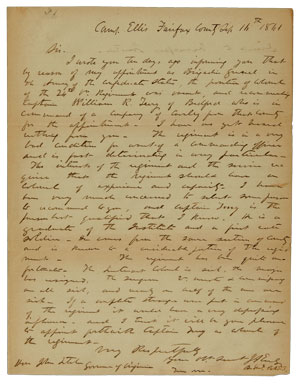 |
Early, Jubal A (1816-1894) Confederate general. War-date autograph letter signed ("J.A. Early") as Brigadier General, 1 page, 10½ x 8 in., Camp Ellis, Fairfax, County, September 16, 1861. To Virginia Governor John Letcher, regarding the condition of the 24th Virginia Volunteers: "I wrote to you ten days ago informing you that by reason of my appointment as Brigadier General in the Army of the Confederate States, the position of Colonel of the 24th Va. Regiment was vacant, and recommending Captain William R. Terry of Bedford…for the appointment - I have as yet heard nothing from you. The regiment is in a very bad condition for want of a Commanding officer and is past deteriorating in any particular. The interests of the regiment and the service require that the regiment should have a Colonel of experience and capacity…Captain Terry is the person best qualified that I know. He is a graduate of the Institute and a first rate soldier. He comes from the same section of country and is known to a considerable portion of the regiment. The regiment has been quite unfortunate. The Lieutenant Colonel is sick, the Major has resigned, the Surgeon Qr. master & commissary are all sick, and nearly one half of the men are sick. If a complete stranger were put in command of the regiment it would have a very depressing influence and I think it will be your pleasure to appoint forthwith Captain Terry as Colonel of the regiment." At top verso, Early wrote, "Direct to Manassas Junction."
After Virginia seceded in April 1861, Early served as colonel commanding the 24th Virginia Infantry Regiment. In June 1861 he took command of the Army of the Potomac's 6th Brigade. He was promoted to brigadier general after fighting courageously at the First Battle of Bull Run (July 1861), near Manassas, Virginia.
Estimated Value $2,500 - 3,500.
Christie's New York, June 9, 2004, lot 259.
View details and enlarged photo
| Realized
$1,860 |
Lot 317 |
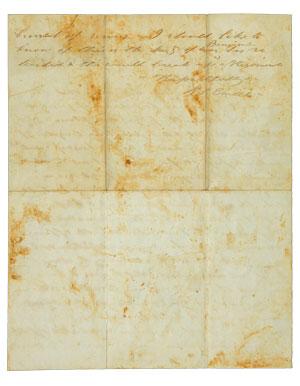 |
Ewell, Richard Stoddert. Two autograph letters signed by the Confederate general ("R.S. Ewell"): (1) 1¼ pages, 9¾ x 7¾ in., no place, April 8, 1862, to an unknown recipient: "There is a rumor that the President has avowed his intention of going to Ten[nes]see, since the death of Genl. A.S. Johnson. If so he will undoubtedly take Taylor & the La. Brigade. If so I will have too many or too few here & if events make it possible for me to be of use in the Peninsula, I hope you will not forget me. All the streams are overflowing & I shall take the opportunity to run up to Rapidan to find out more definite information as to the forces &c. at Fredericksburg, the officer in command & how far my jurisdiction extends. Stuart started his cavalry today though I did not understand that he was to hurry off any but the one company to relieve the one at Rapidan….Some of the companies re-enlisted of the 13 Va. claim the right at end of 12 months time to go where they please to serve in any branch of service. I should like to know of this as the Sec. of War Benjamin has so decided & this would break up a Regiment." Scattered staining and a couple of small edge splits; verso is somewhat faded, including signature. (2) 2¼ pages, 8¾ x 5 5/8 in., on Head Quarters Department of Richmond stationery, June 11, 1864, to Gen. Braxton Bragg. In part: "There are two Battalions of Artillery under Col. Carter along the line of the Chickahominy, left there by Gen. R.E. Lee. I have informed Gen. Hampton of this and requested him to send a Cavalry escort to take charge of the Batteries that will be sent to his assistance, as I have no support to send with them, the Locals and reserves being at Chaffin's Bluff, by Gen. Lee's order….I will notify Col. Carter that Gen. Hampton will call on him at Bottom's bridge for one or two Batteries--and Lt. Col Pemberton will be ordered to send two Batteries to that point to be ready either to go to White House or take the place of the Batteries of Carter's Battalion, as may be most expedient. Unfortunately I have no Infantry support that I could send with the betteries…." This letter has a P.S. signed "R.S. Ewell" and a second P.S. initialed "RSE." Foxed and inlaid; script and signatures are very faint, but content is very good.
Estimated Value $1,200 - 1,500.
View details and enlarged photos
| Realized
$690 |
Lot 318 |
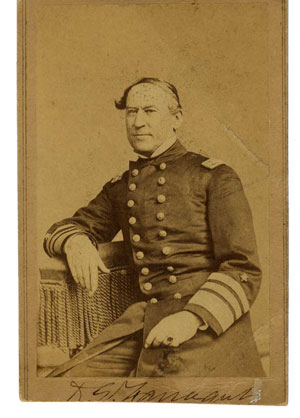 |
Farragut, David G (1801- 1870) The first U.S. Naval officer to hold the rank of full admiral. Son of a Revolutionary War naval lieutenant, he was adopted by naval officer David Porter, a friend of his father's, in 1808 after the death of his mother. He went to sea at the age of nine and served in the War of 1812 under Capt. David Porter. At the age of twelve, he was wounded and captured by the British at Valparaiso Bay, Chile. His long and distinguished career lasted for 60 years. His order at the battle of Mobile Bay, where he won a major victory, is still remembered; it has been paraphrased to "Damn the torpedoes, full speed ahead!"
Carte de visite signed twice, "D.G. Farragut" on the lower mount, and "D.G. Farragut Vice Admiral" on the verso, 3¾ x 2½ in. A three-quarter, seated photo with imprint of J. Gurney & Son, Broadway, N.Y. on verso. Mount slightly trimmed at upper and lower edges; slight soiling and a couple of diagonal creases. After Farragut's victory in the Battle of Mobile Bay (Aug. 5, 1864), President Lincoln promoted Farragut to vice admiral on December 21, 1864. He was promoted to full admiral on July 25, 1866, so this photograph was taken within those two dates.
Estimated Value $500 - 750.
View details and enlarged photos
| Realized
$960 |
Lot 319 |
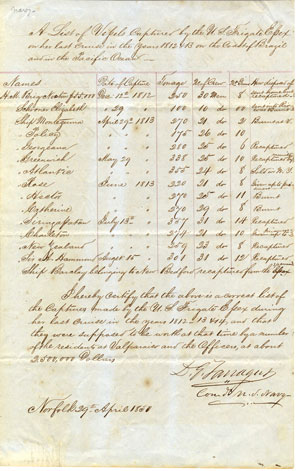 |
Farragut, David Glasgow. Document signed ("D.G. Farragut / Comdr U.S. Navy"), 1 page, 12½ x 8 in., Norfolk, April 1850. Pale blue paper, integral leaf; light toning. The document comprising "A List of Vessels captured by the U.S. Frigate Essex on her last cruise in the years 1812 & 13 on the Coast of Brazil and in the Pacific Ocean." Fifteen warships are listed, along with the date of their capture, their tonnage, the number of crewmen, the number of guns, and how each ship was disposed of, including "Burnt…sent home but recaptured…Given up to prisoners…Sold in N.Y.," etc. Farragut certifies that the list is correct and that the ships "were supposed to be worth at that time by a number of the residents at Valparaiso and the Officers, at about 2,500,000 Dollars." One wonders why Farragut chose, almost forty years later, to document the prizes of the Essex, the ship on which he served as a young twelve-year-old prizemaster. Certainly a rare document.
Estimated Value $2,000 - 3,000.
View details and enlarged photo
| Realized
$1,170 |
Lot 320 |
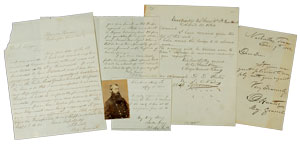 |
Five Union Generals. John Henry Martindale ALS ("J.H. Martindale"), 2 pages, 8 x 5 in., Sandy Hill Wash Co N.Y., Aug. 20, 1861, to Gen. Marsena R. Patrick, recommending the son of an old friend who "has been devoting careful attention to 'Hardee's tactics'" to be Captain of a company he has been raising for the war.
Solomon Meredith ALS ("S. Meredith"), 1 page, 9¾ x 7¾ in., Avenue House, Washington, Oct. 25, 1862, to D.N. Berg, relaying the delay in receiving his own commission as Brig. Gen. and recommending that Berg secure a commission from Gov. Morton, then be transferred to Meredith's staff. Paper loss at upper left does not affect text.
David Hunter ALS ("D.Hunter"), 1 page, 8 x 5 in., Nashville, Tenn., Dec. 9, 1862, to an unidentified recipient: "It gives me great pleasure to comply with your request."
William Buel Franklin ALS ("W.B. Franklin"), 1 page, 9¾ x 7¾ in., Headquarters U.S. Forces, Western La. Grand Encore La, April 15, 1864, to Admiral David D. Porter: "I have received your two notes of this date. I have ordered the bridge to be opened at once. The wagons will be turned over to Lt. Comr. Selfridge to-morrow morning as you request."
David McMurtrie Gregg ALS ("D MM Gregg"), 1 page, 4¼ x 5 in., Chestnut Hill, Pa, May 18, 1865, to an unidentified Colonel: …I have the honor to subscribe myself with the rank I bore at the date of my resignation from the U.S.Service." (5 items).
Estimated Value $1,000 - 2,000.
Christie's New York, June 9, 2004, lot 341.
View details and enlarged photo
| Realized
$600 |
Lot 321 |
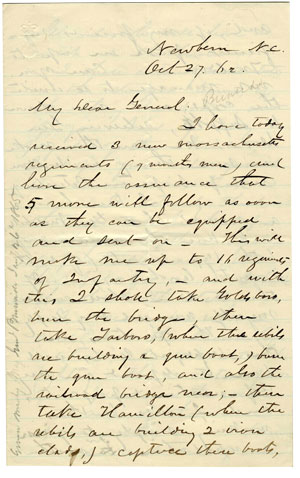 |
Foster, John Gray (1823-1874) Union general. War-date autograph letter signed ("J.G. Foster"), 4 pages, 8 x 5 in., Newbern, N.C., Oct. 27, 1862. To General Ambrose Burnside, reporting what he planned to do to the enemy as soon as new Massachusetts regiments arrived: "I have today received 3 new Massachusetts regiments (9 months men) and have the assurance that 5 more will follow as soon as they can be equipped and sent on. This will make me up to 16 regiments of Infantry, and with this I shall take Goldsboro, burn the bridges, then take Tarboro (where the rebils are building a gun boat) burn the gun boat, and also the railroad bridge near; then take Hamilton (where the rebils are building 2 iron clads) capture their boats, and if my force is sufficient, push on up to Weldon. Can you not manage to re-unite the corps, and come down to Suffolk, relieving Gen. Dix. We can then make a sure thing on Weldon and perhaps on Petersburg…." Foster commanded the 1st Brigade in Maj. Gen. Ambrose Burnside's North Carolina Expedition. He was breveted for Sumter, Roanoke, New Bern, and Savannah.
Estimated Value $600 - 800.
Christie's New York, June 9, 2004, lot 265.
View details and enlarged photos
| Realized
$180 |
Lot 322 |
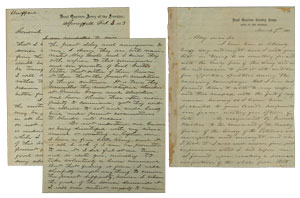 |
Generals George Stoneman, John M. Schofield, & Others. George Stoneman ALS, 6 pages, Head quarters Cavalry Corps, Army of the Potomac, Mar. 7, 1863. Staining to last page and mounting strip at left margin. To Mr. Wilson, U.S.S. Mily Comte, describing his efforts at putting "the Cavly force of this army…into condition for effective operations during the coming campaign….My assignment by General Hooker to the command of the Cavalry force of the Army of the Potomac was unexpected and unsought….I found upon making a personal inspection ofo the whole force that I had a mass on my hands…divided and subdivided unorganized and disorganized, with neither head or system….I have now succeeded pretty well in…organizing the whole into Divisions and Brigades and establishing a system a system of responsibility….….I have had several officers dismissed and delinquents are beginning to do through fear what they failed to perform from a sense of duty…." More good content.
John M. Schofield ALS ("J.M. Schofield"), 7 pages, 9 x 7½ in., Head Quarters Army of the Frontier, Springfield, Feb. 3, 1863. Marked "Unofficial" at top, to Maj. Genl. H.W. Hallek, Genl. in Chief: "I am compelled to say that I believe the interest of the service demands my removal from this command. While it would be mortifying to me to be transferred to an inferior one I will cheerfully submit to it rather than remain here longer….I do not desire to impugn the motives of General Curtis….The fact is undeniable that his whole concern while I have been in command of this army has been calculated to prevent my accomplishing any good result. He has discouraged every advance I have made and repeatedly ordered me to fall back. He detained me in St. Louis nearly a week…for no other reason than to give Blunt and Herron time to make their raid to Van Buren….I have been lying here five days while the roads and weather are fine, and I can not get permission to move in any direction….We must move to the Eastern part of the State….Why not do it now….we would be in position to unite with Davidson and Warren should the enemys force be too strong….I have no doubt I can easily whip their entire force combined….I have already lost six days since my Eastward movement was stopped by Genl Curtis' order….I can see…no other object but to delay my movement and prevent my doing any thing until some ulterior object can be accomplished probably to give some other officer the command….Blunt and Herron are in St. Louis….I know they both aspire to this command and are favorites of Genl Curtis…It is true they committed the most stupid blunders at Prairie Grove and elsewhere and have shown their utter incapacity to command, yet they…could hardly fail under present circumstances to blunder into success….I have a fine little army, and it is all I ask if I can be permitted to use it." With William D. Whipple ALS ("Wm D. Whipple"), 1½ pages, Head-Quarters Dep. of the Cumberland, Field, Dec. 21, 1864, to J.H. Wilson, saying the Maj. Gen. Comdy. (Gen. Geo. H. Thomas), wanted to recommend Willson (who headed the Cav. Corps Mil. Div. of Miss.), and Gen. Hatch for promotion. James W. Lowe AES, 1 page, In Camp, Wayne Co., NC, April 5, 1865, regarding the requisition of cattle; and C. Groom ADS, 1 page, Hd. Ars Brigade Senaca Creek, Ms., Oct. 17, 1862. A telegram to Col Beckwith: "Capt. Bliss is not under my command, but I have enclosed your telegram to Genl. Stoneman for his action in the case."
Estimated Value $1,500 - 2,000.
View details and enlarged photos
| Realized
$660 |
Lot 323 |
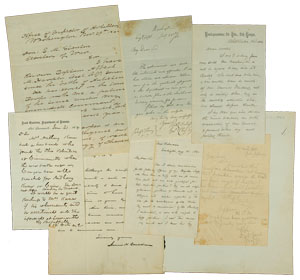 |
Generals King, Couch, Carleton, Curtis, Crawford, Howe, and Delafield. Rufus King ALS as Brig. Genl., 2 page, 8 x 5 in., Camp Kalarama,Washington, Aug. 16, 1861. To an unknown recipient asking for commissions for three Wisconsin officers on his staff, who are "gentlemen of character and intelligence and zeaous supporters of the war for the maintenance of the Union…." Darius Nash Couch ALS ("D.N.Couch") as Maj. Gen., 1 page, 7½ x 5 in., Div. Hd Qrs, 2½ miles from Jefferson (1862). Tipped to a larger sheet, stains at lower left. To Gen. Marcy: "I marched this morning via Adamstown not knowing that Franklin was on the road and find myself halted by his train….My 4 guns have got over and Infantry coming down." James H. Carleton, ALS, 1 page, 9¾ x 7¾ in., Head-Quarters, Dept. of New Mexico, Mar. 9, 1864, regretting that he could not get autographs to a man in Albany, N.Y. in time for the Great Fair. (The Sanitary Commission Fair to raise funds for Union wounded took place Feb. 22-Mar. 5 in Albany). Samuel R. Curtis ALS ("S.R. Curtis") as Maj. Gen., 1 page, 8 x 5 in., Head Quarters, Dept. of Kansas, Fort Leavenworth, June 21, 1864. To an unidentified recipient, asking for the whereabouts of a soldier who had joined the Ohio Volunteers at Cincinnati and whose wife doesn't know his company or regiment.
Samuel Wylie Crawford ALS ("S.W. Crawford"), 3 pages, 8 x 5 in., Headquarters 3d Div., 5th Corps, Sept. 14, 1864. To Doctor Carnac, thanking him for the kind attention that Mrs. Carnac has shown his aid Lt. Clarke: "I do so deeply regret that his being with me should have resulted so seriously. I very much regreted to hear that your hospital had been taken from you…." Albion Parris Howe ALS ("A.P. Howe") as Brig. Genl. Inspr. of Arty., 2 pages, 10 x 7¾ in., Office of Inspector of Artillery, Washington, Nov. 29,1864. To Secretary of War E.M. Stanton recommending Capt. Albert M. Harper, Asst. Adjt. General, whom he has know since the battle of Antietam and who served in the same Corps with him, part of the time under his command. "I regard Captain Harper as one of the most promising officers of his rank…." Richard Delafield ALS ("Rich.d Delafield") as Genl. & Chief Engineer, 1 page, 8 x 5 in., Washington, Jan. 25, 1865. To Prof. Joseph Henry (Secretary of the Smithsonian Institution), "The astronomical and such like instruments and apparatus, I can have stored and otherwise taken care, in the apartments assigned to this Department, in case you have no suitable place at the Smithsonian building fit for use." (7 items).
Estimated Value $1,500 - 2,000.
View details and enlarged photo
| Realized
$660 |
Lot 324 |
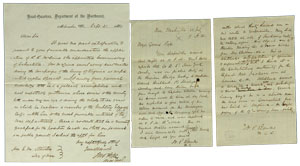 |
Generals Nathaniel P. Banks and John Pope. Nathaniel Banks ALS ("N.P. Banks") as Maj. Gen., 2 pages, 8 x 5 in., Near Washington, July 21, 9 A.M. [1862]. To Maj. Gen. Pope: "General Hatch reports that Co B. 5" - New York Cavalry was on picket duty at the Rapidan Bridge leading to Madison. Colonel Brodhead 1st Michigan Cavalry had been driven back from Orange to Rapidan Station swimming his horses across the River at day break. He neglected to give notice of his return movement or his messengers were cut off. The company got no order to move and were captured at 3 P.M. 18th instant….I will communicate with Generals McDowell and Siegel as you direct." ALS ("N.P. Banks") as M.G.C., 2 pages, 8 x 5 in., Near Washington, July 21, 9 A.M. [1862]. To Maj. Gen. Pope, Washington: "The first report of Jacksons force at Louisa Court House came from General Hatch. It was reported among the People. A man named Whitlock had been sent towards Richmond two weeks since by General Geary & returned while Hatch was near Madison & was taken up by his scouts. Whitlock left Richmond last Thursday went by way of Lynchburg to Charlottesville into our lines. He says they refused to allow him to travel by Gordonsville the road being used for troops. At Richmond it was the common impression that Jackson with about thirty thousand was on his route to Gordonsville….His object was to threaten Washington to draw troops from McClellan etc…." John Pope ALS, 1 page, on Head-Quarters, Department of the Northwest, Milwaukee, Wis., Sept. 21, 1864. To Secretary of War E.M. Stanton, recommending R.R. McCaine, a member of the Military Telegraph Corps, as Commissary of Subsistence. "Mr. McCaine served at my Head Quarters during the campaign of the Army of Virginia as confidential cypher operator…[His] services to the country…entitle him to the most favorable interest of the War Department…."
Estimated Value $1,500 - 2,000.
View details and enlarged photo
| Realized
$660 |
Lot 325 |
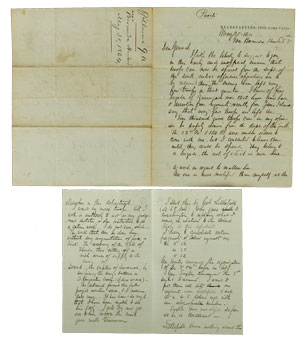 |
Gilmore, Quincy Adams (1825-1888) Union general. Autograph letter signed ("Q.A. Gilmore"), 4 pages, 8 x 5 in., Folly Island, S.C., Dec. 14, 1863, to Gen. G.W. Cullum, Chief of Staff, Hd. Qrs. of the Army. In part: "I think nothing will be done by the Monitor in Charleston Harbor. Four new monitors have been waited for since the 1st of September. They were expected to bring 10 more guns. The conditions of the problem have altogether changed within three months….The enemy…have lined the shores of the inner harbor with batteries. The city wharves are also covered with guns….I want no more troops. All I ask is authority to act as my judgement dictates….The work that can be done here, without any augmentation of force is First. The recovery of the State of Florida, thus cutting off a rich source of supply to the enemy. or, Second. The capture of Savannah, by surprising the enemy's batteries on St. Augustine Creek….I desire to consolidate certain fragments of colored regiments in the 3d S.C. 4 S.C. 5 S.C….I want to put them all into one regiment under Littlefield, & call it a U.S. colored regt. with an appropriate number…."
Together with an autograph letter signed ("Q.A. Gilmore"), 3 pages, on Headquarters, 10th Army Corps letterhead, near Bermuda Hundred, Va., May 30, 1864. To Maj. Gen. Hallek, asking if troops can be spared from the Dept of the South. "I know of five brigades of Beauregard's men that have come here & deserters from regiments recently from James Island, say that very few troops are left there….No one is more mortified than myself at the unsuccesful result of operations here. With a force of three men to the enemy's two we have not only failed to retain an offensive attitude at all, but are now on the defensive, with an enemy fortified on our front between us and the rail-road. I am deeply chagrined at the tone the public press has adopted toward General Butler….The battle of Drury's Bluff was a disaster to us….Erroneous reports of movements of the enemy elsewhere, was the cause of the retreat at the time when there seemed to be no necessity for it. What I most regret is my loss in men (3927 since we landed here.) without adequate compensation. the 18th corps have lost about 2000 more, I am told, nearly 6000 in all…There is a long story to be told of operations here but I cannot act the part of historian now."
Estimated Value $1,000 - 1,500.
View details and enlarged photos
| Realized
$300 |
Lot 326 |
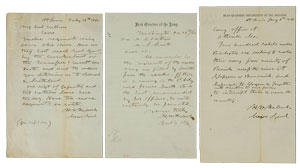 |
Hallek, Henry W (1815-1872) Three autograph letters signed ("H.W. Hallek"), two as Major General and the third as General in Chief, 3 pages, approximately 8 x 5¼ in.: (1) on Head Quarters Department of the Missouri letterhead, St Louis, Jan. 6, 1862, to Commanding Officer, Otterville, Mo.: "Four hundred rebels under Poindexter are seeking to make their way from vicinity of Renick across the river at Glasgow or Brunswick. Send messenger to Glasgow & Fayette with direction to our forces to intercept them & scour the country." (2) St. Louis, Feb. 15, 1862, to Brig. Gen. Cullum, Cairo: "…twelve regiments coming down Ohio River. How can they reach Genl Grant, by the Cumberland or the Tennessee? Consult Com. Foote and send the orders you determine on to Paducah & Smithland. One regt of Infantry and two batteries leave here to-day. Have ten more regiments en route." At lower left, Hallek notes (in cipher) and there are some erased figures below that order. (3) on Head Quarters of the Army letterhead, Dec. 26, 1862, to U.S. senator from California M.S. Latham: "All vacancies in the regiments of the regular army are filled by formation from the ranks. If thre is a vacancy in the 3d Artry and James Smith stands the best recommended by his officers, he will certainly be promoted."
Hallek replaced Frémont in November 1861 and proved to be an able administrator, but as a field commander, he was a failure and Lincoln recalled him to Washington as general in chief. A Grant biographer said, "Unable to command successfully one army, he was ordered to Washington to command all the armies." (A.W. Alexander, Grant as a Soldier, p. 89). Lincoln came to regard him as "little more than a first rate clerk."
Estimated Value $1,200 - 1,500.
Christie's New York June 0, 2004, lot 271.
View details and enlarged photo
| Realized
$720 |
Lot 327 |
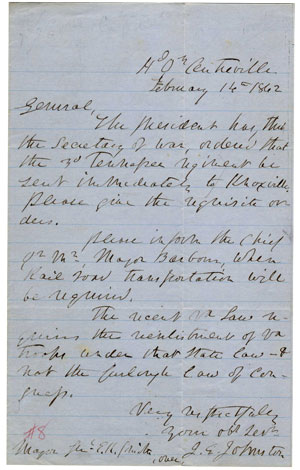 |
Johnston, Joseph E (1807-1891) Confederate general; commander of the Army of the Army of the Potomac and the Department of Northern Virginia until he was severely wounded at the Battle of Seven Pines (May 31-June 1, 1862) and replaced by Robert E. Lee. Autograph letter signed ("J.E. Johnston") with postscript initialed ("J.E.J."), 1½ pages, on blue, ruled bifolium, 8 x 5 in., Headquarters, Centreville (Va.), February 14, 1862. To Major General E.U. Smith: "The President has, thru the Secretary of War, ordered that the 3d Tennessee regiment be sent immediately to Knoxville. Please give the requisite orders. Please inform the Chief Qr Mr., Major Barbour, when Rail road transportation will be required. The recent Va. Law requires the reenlistment of Va. troops under that state - & not the furlough law of Congress." He adds a note: "Did you receive a note from me asking for an artillery report -- to give the number & calibres of your pieces & the names & merit, absolute & relative, of the artillery officers? Please let me have it when you can."
Estimated Value $1,200 - 1,500.
Christie's New York, June 4, 2009, lot 278.
View details and enlarged photo
| Realized
$1,800 |
Lot 328 |
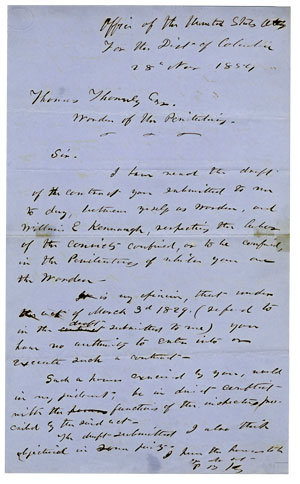 |
Key, Philip Barton (1818-1859) U. S. Attorney for the District of Columbia and son of Francis Scott Key, writer of the poem which became the lyrics to "The Star Spangled Banner." Philip is most famous for being murdered (he was unarmed) by Congressman Daniel Sickles (1819-1914), a notorious philanderer and future Civil War general, after Sickles discovered that his wife, Teresa Bagioli (1836-1867) was having an affair with Key. Sickles defended himself by adopting a defense of temporary insanity, the first time it had ever been used in the United States, and got off. Never was Sickles' own disreputable history brought up, including the fact that he had been censured by the New York State Assembly for escorting a known prostitute, Fanny White, into its chambers, or that he had taken White to England with him, leaving his pregnant wife at home, or that he had even presented White to Queen Victoria. In fact, Sickles was declared a hero for "saving all the ladies of Washington from this rogue named Key."
Autograph letter signed ("P B K"), 1 page, on blue paper, 12¼ x 7½ in., Office of the United States Atty. For the Dist of Columbia, Nov. 28, 1854. To Thomas Thornl[e]y, Warden of the Penitentiary, regarding a contract between Thornley, as warden, and William E. Kennaugh, "respecting the labor of the convicts - confined, or to be confined, in the Penitentiary of which you are the warden. It is my opinion, that under the act of March 3d 1829…you have no authority to enter into or execute such a contract…."
Estimated Value $300 - 500.
View details and enlarged photo
| Realized
$168 |
Lot 329 |
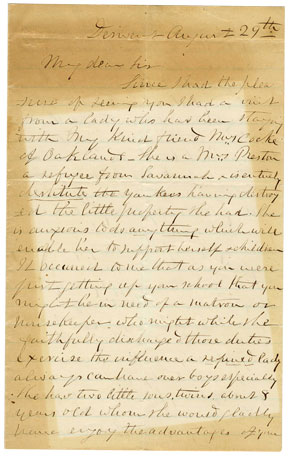 |
Lee, Mary Custis (1808-1873) Wife of Confederate General Robert E. Lee; great granddaughter of Martha Washington, from Mrs. Washington's first marriage to Daniel Custis. Autograph letter signed ("M C Lee"), 2 1/3 pages, 8 x 5 in., Denver (West Va.), Aug. 29 (1867). To an unnamed correspondent: "…Mrs. Preston a refugee from Savannah who is entirely destitute the Yankees having destroyed the little property she had. She is anxious to do anything which will enable her to support herself & children. It occurred to me that as you were just setting up your school that you might be in need of a matron or housekeeper who might while she faithfully discharged those duties exercise the influence a refined lady always can have over boys….She would rather prefer to teach young children…but is willing to do anything which will give her some income….She is very pleasing and gentle in her manners and a perfect lady….The Genl & my family write with me in kind regards to you & yours." Docket on verso reads "Mrs. R E Lee." Splitting to vertical seam of bifolium; uneven browning. An interesting letter with war-related content.
Estimated Value $350 - 450.
View details and enlarged photos
| Realized
$225 |
Lot 330 |
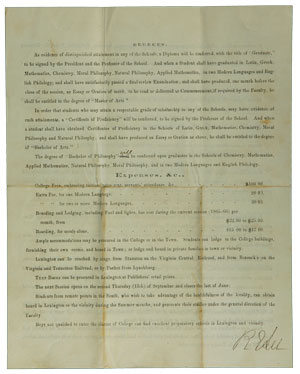 |
Lee, Robert E. Autograph letter signed ("R E Lee") as President of Washington College, 1 page, 8¼ x 5¼, Lexington, Va., June 2, 1866. To Wesley E. Gatewood of Morgan County, Ohio: "My dear Sir In reply to your letter of the 17th ultr; I send a prospectus of the Course of studies at Washington College, which I hope will furnish you with all the information you desire concerning that Institution. As you are so desirous of obtaining an education, I feel assured that you will make adequate efforts to secure one and as the various Colleges in the Country afford such ample opportunities, I have no doubt of of your success. Wishing you all happiness…." With holograph envelope.
Accompanied by the prospectus to which General Lee refers, signed ("R E Lee") at the end, 4 pages, with holograph date and two course additions. General Robert E. Lee is listed as President and one of the courses has a printed note: "This Course has been organized temporarily, to meet the wants of youg men whose education has been interrupted by the war." The General Remarks note that the President "visits from time to time the different lecture rooms, attends recitations and reviews and receives weekly reports of the standing and progress of all the Students…." It is interesting to note that a year after the end of the war, a student from the North was contemplating attending a college in the south whose president was the legendary Southern general. After the war, General Lee was left with no means of support. He accepted the job as president of the tiny college, which had only 40 students and was on the verge of bankrupcy. He was an excellent administrator, having served as superintendent of West Point before the war. When Lee died in 1870 the school was $100,000 in the black, had 15 faculty members, and offered ten major areas of study, including a law school. The name of the school was changed to Washington and Lee College after Lee's death. Two items signed by General Robert E. Lee.
Estimated Value $4,000 - 6,000.
Christophe Stickel Autographs.
View details and enlarged photos
| Realized
$5,520 |
Lot 331 |
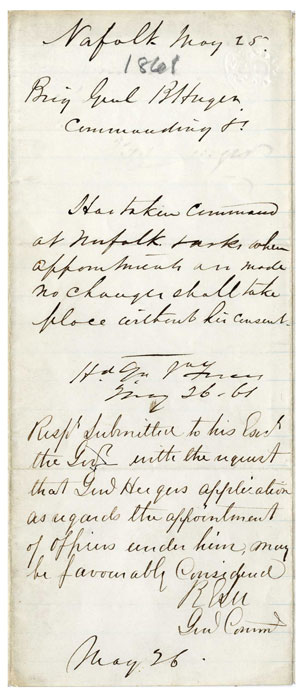 |
Lee, Robert E (1807-1870) Legendary Confederate general. Autograph endorsement signed ("R E Lee / Genl Commy"), 2¼ pages, 8 x 5 in., on the verso of a letter from Brig. Gen. Benjamin Huger, who had just taken command of forces around Norfolk, asking Gen. Lee that no changes be made in appointments without Huger's consent. Huger's letter is 1¼ pages and datelined Norfolk, May 25 (1861). Lee supports Huger's request and forwards his endorsement to the governor (John Letcher): "Hd Qrs Va Forces May 26, 61 / Respy Submitted to his Excl. the Govr. wth the request that Genl Hugers application as regards the appointment of officers under him, may be favourably Considered…." Written on the verso of the blank integral leaf, below the docket.
Benjamin Huger (1805-1877) commanded the Charleston Arsenal from 1860 to the spring of 1861. He was commissioned an infantry lieutenant colonel in the regular Confederate Army on March 16, and then briefly commanded the forces in and around Norfolk, Virginia. On May 22 he was appointed a brigadier general in the state's militia, and the next day took command of the Department of Norfolk, with defensive responsibilities for North Carolina and southern Virginia, with his headquarters located at Norfolk. On June 17, Huger entered the Confederate volunteer forces as a brigadier general, and in October, he was promoted to the rank of major general.
Estimated Value $3,000 - 5,000.
View details and enlarged photo
| Realized
$4,200 |
Lot 332 |
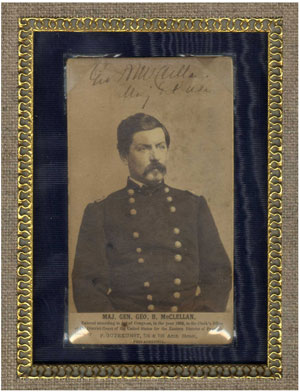 |
McClellan, George B (1826-1885) Second Commanding General of the Union Army. War-date carte de visite photograph signed ("Geo B McClellan / Maj Genl USA"), 4 x 2 3/8 in. A waist-length photo in uniform by F. Gutekunst, Philadelphia, 1863. Matted in linen and gilt and contained in an attractive black wood and gilt frame; easily removed if desired.
Estimated Value $1,000 - 1,250.
View details and enlarged photo
| Realized
$600 |
Lot 333 |
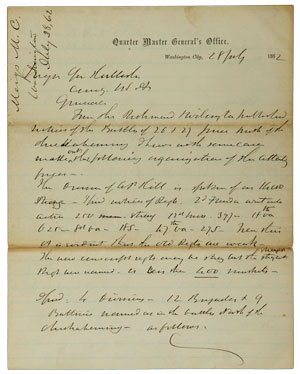 |
Meigs, Montgomery C (1816-1892) Quartermaster General of the Union Army. His services were so valuable that Secretary of State William H. Seward said of him, "…without the services of this eminent soldier the national cause must have been lost or deeply imperiled." Autograph letter signed ("M.C. Meigs / Q.M. Gen.") on Quarter Master General's Office stationery, 3 pages, 10 x 7¾ in., Washington, July 28, 1862. Slight soiling to first page. To Major General Halleck. Using published notices in Richmond and Wilmington, Meigs analyzes the size of Lee's forces after the Peninsular Campaign, estimating them to be some 105,000. "I find: four Divisions. 12 Brigades & 9 Batteries named as in the battles North of the Chickahominy." He breaks down what he thinks are the sizes of the four divisions under Stonewall Jackson, D.H. Hill, A.P. Hill, and James Longstreet. "These notes may be of use in dealing with this army. Gives the distribution of some 60 Regiments which must be nearly one half the whole Richmond army. An intelligent writer of Branch's Division…says that Carolina & Ga contributed full one half the Regts engaged in the Richmond battles from 36 to 40 Regts each. This would make the whole army in his opinion 162 Regts which at 700 men average would give a total force of 105000….a careful comparison of the notices which appear in the newspapers, lists of prisoners of war & deserters…would soon give us a tolerable correct idea of the forces opposing us. If this has ever been done in this part of the country there is I fear reason to believe that it has been done by incompetent or unfaithful hands…." Lee's force was actually about 88,000. Meigs obviously should have left the exaggerations to McClellan and stuck to provisioning the Union Army, at which he was superb.
Estimated Value $900 - 1,200.
Christie's New York, June 4, 2004, lot 307.
View details and enlarged photos
| Realized
$528 |
Lot 334 |
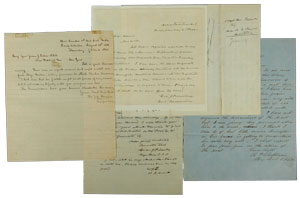 |
Pillow, Gideon Johnson. Two war-date letters signed by Confederate General Pillow, with one copy of a dispatch sent by Pillow and two letters written to him: (1) letter signed ("Gid. J. Pillow"), 2 pages, 9¾ x 7¾ in., Head Quarters, Army of Tenn., Memphis, June 24, 1861, to R.G. Payne, Senator, responding to criticism from the state's Military Board over his expenditures: "…If my efforts to defend the Country are to be thus circumscribed, my powers restricted, my energies broken, and all and every discretion taken from me, and at the same time, I am to be held responsible for the safety of the Country, you will be able to appreciate the embarrassments of my position….If the Legislature would be of opinion that I ca not be safely trusted…I am prepared to return them the commission with which they empowered the Governor to honor me." Pillow won this argument but was in hot water again a year later for abandoning Fort Donelson (Feb. '62); at that time, he was reprimanded and suspended and was never given another important command in the field. (2) autograph letter signed ("Gid. J. Pillow" / Brig Gen C.S.A."), 1 page, 9 x 7 in., Murfreesboro, Nov. 22, 1862, to an unidentified general, asking for reimbursement of his travel exenses to Richmond on government business. (3) Copy of a dispatch sent by Pillow to Gov. (Isham) Harris in Nashville (as noted on docket), 1 page, 6¾ x 7¾ in., from Head Quarters A[rmy] T[ennessee], Memphis, May 25, 1861,: "Col. Travis Regiment advances today to Union City - Tomorrow--Stephens' Regt. follows. Monday our Regiment from Corinth--Tuesday another. I can have the other Regiments now at Jackson already mustered into the service of Tennessee, mustered likewise into the Confederate States Service. This it seems to me, meets the instructions in regards to arms. Please say if I shall do so and issue the arms?" (4) autograph letter signed ("B.F. Cheatham" / Brig. Gel. P.A. of Tenn."), 1 page, 10 x 8 in., Upper Mouth of Hatchee, May 23, '61 to Gen. Pillow, saying they are landing two 32 pounders, talking of Capt. Picket, etc. and (5) an autograph letter signed (" M. Jeff Thompson"), 1 page, 9 x 7¾ in., Head Quarters 1st Mil. District, Camp Sikeston, Aug. 15, 1861, to Gen. Pillow: "…All is quiet this morning….Major Millen asking permission to attack Benton….I told him that his pickets might smell powder…but do not move my Infanty until you reinforcd me here. The Tennesseans have gone toward Charleston this morning." (5 items total).
Estimated Value $2,000 - 3,000.
Christie's New York, June 9, 2004, lot 314.
View details and enlarged photo
| Realized
$720 |
Lot 335 |
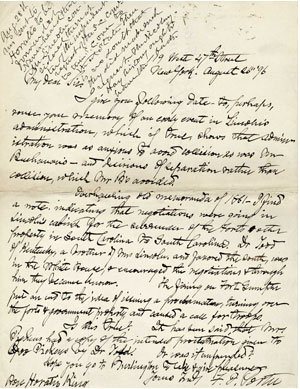 |
Porter, Fitz John (1822-1901) Union general. At the battle of Second Bull Run (Aug. 29, 1862), he disobeyed orders from Gen. John Pope because of counter-intelligence he had received, of which Pope was not aware. At a politically-motivated court-martial, he was found guilty of disobedience and misconduct, and dismissed from the Army on January 21, 1863. Porter never gave up seeking vindication and in 1878, he was exonerated by a special commission under Gen. John M. Schofield, which found that Porter's actions had probably saved Pope's Army of Virginia from an even greater defeat. In 1886, President Chester Arthur reversed Porter's sentence and a special act of Congress restored Porter's commission as an infantry colonel in the U.S. Army, backdated to May 14, 1861, but without back pay. On August 7, 1886, Porter retired from the Army.
Autograph letter signed ("F.J. Porter"), one page, 10½ x 8 in., New York, Aug. 26 (18)96. To Hon. Horatio King, who briefly served as Postmaster General under James Buchanan (Feb. 12 until March 7, 1861): "I give you following date to, perhaps, rouse your memory of an early event in Lincoln's administration, which if true, shows that administration was as anxious to avoid collision as was Mr. Buchanan's -- and decisions of separation rather than collision, which Mr. B's avoided. Overhauling old memoranda of 1861 I find a note, indicating that negotiations were going in Lincoln's cabinet for the surrender of the Forts & other property in South Carolina to South Carolina. Dr. Todd of Kentucky, a brother of Mrs. Lincoln and favored the South, was in the White Huse, & encouraged the negotiations & through him they became known. The firing on Fort Sumpter put an end to the idea of issuing a proclamation, turning over the forts & government property, and caused a call for troops. Is this true? It has been said that Mrs. Pickens had a copy of the intended proclamation given to Dr. Pickens by Dr. Todd. Or was it unfounded?…" Boldly penned and signed.
A note in King's hand at top left says in part, "Never heard that Mr. Lincoln considered the matter of the impudent request of the S.C. Comrs. to turn S.C. over to that State. There is no doubt that they did make such request. The Nicolay-Hay history ought to have the facts."
Estimated Value $800 - 1,000.
Christie's, New York, June 9, 2004.
View details and enlarged photo
| Realized
$240 |
Lot 336 |
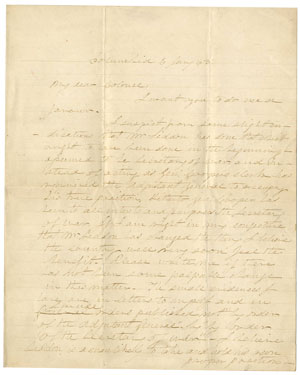 |
Preston, John Smith (1809-1881) Confederate Brigadier General. Autograph letter signed ("Jno S. Preston"), 4 pages, Columbia (SC), Jan. 6 (18)63. To Col. (James) Chestnut, who was aide to CSA President Jefferson Davis, with good content. Preston was Assistant Adjutant General at that time; he supervised the prison camp in Columbia and performed recruiting duties. Brown ink is somewhat faded; soiling to last page. "I suspect…that Mr. [James] Siddon has done that which ought to have been done in the beginning--assumed to be Secretary of War…I believe Seddon is a man likely to take and hold his own proper position…." He discusses his problems in carrying out his duties. "…I have been unfairly dealt with about this d--d conscription which is a grand thing in its principle…but low mean and dirty work as the Department prepares to execute it. I wish you would get Gen: Orders 82 and read it…." He goes into detail, states that the blame will fall on him and that he has asked to be relieved and must resign his commission. He has already made plans to go the West as a "'hanger-on' to one of the Mississippi armies….I telegraphed you that Beauregard had suspended the election in the Reserves--and I believe he will persist--and will also present it in any other Regiment in which the officers have been appointed…I do hope the President will sustain him…." In 1864 Preston was promoted to brigadier general.
Estimated Value $400 - 600.
Christie's, June 9, 2004, lot 253.
View details and enlarged photos
| Realized
$228 |
Lot 337 |
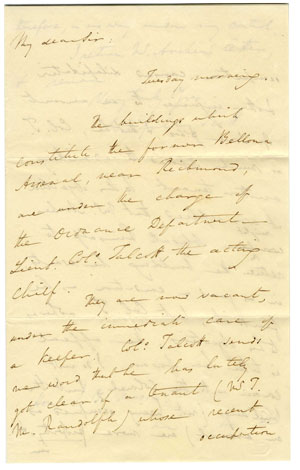 |
Scott, Winfield (1786-1866) United States Army general, known as "Old Fuss and Feathers"; unsuccessful presidential candidate in 1852. Autograph letter signed, 2¼ pages, 8 x 5 in., no place, no date (c. 1844). To an unknown recipient regarding "the former Bellona Arsenal, near Richmond…under the charge of the Ordnance Department--Lieut. Colo. Talcott, the acting Chief." It seems the latest tenant, by the name of Randolph, left damages worth $1600 and Col. Talbot is opposed to renting to a Mr. Archer, who will take the building as is. Scott does not agree with Talbott "but the buildings (not being occupied as an arsenal) are mere property, & therefore, in no way under my control…." Bellona Foundry had supplied ordnance to the U.S. Army and Navy, but after 1832 it only received and stored cannons. The Army removed the garrison to Fort Monroe in 1833 and left a caretaker. Thomas Randolph and a partner leased several buildings for a silkworm farm until 1844, when Doctor Junius L. Archer leased a residence from the Arsenal complex. In 1856, Doctor Archer purchased Bellona Arsenal from the federal government for $2650.
Estimated Value $200 - 250.
View details and enlarged photos
| Realized
$138 |
Lot 338 |
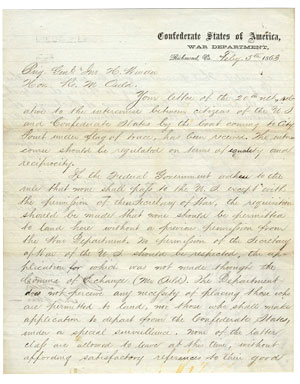 |
Seddon, James A (1815-1880) American lawyer and politician who served two terms as a Representative in the U.S. Congress, as a member of the Democratic Party. In 1862 Seddon was appointed Confederate States Secretary of War by Jefferson Davis. Letter signed as Secretary of War, 2 pages, recto & verso, 10 x 8 in., on lined Confederate States of America, War Department letterhead, Richmond, Virginia, February 5, 1863. To Brig. General Jonathan Winder and Hon. Robert M. Ould. The Secretary struggles with one of the toughest problems of a nation torn by civil war: how can civilians from the Confederacy travel into Union states and vice versa. Northerners could not pass south without the approval of the War Department in Washington. Seddon proposes Southerners should require similar permission from Richmond to go north. In part: "…The Department does not perceive any necessity of placing those who are permitted to land, nor those who shall make application to depart from the Confederate States under a special allowance. None of the latter class are allowed to leave at this time, without affording satisfactory references to their good character. That precaution will be continued. The Department is quite willing to place the subject in the hands of the Commissioners of Exchange of Prisoners, and that they may determine who shall be allowed to go and return on either side. It does not desire to impose restrictions or embarassments in the way of such intercourse as it is willing to allow at all. The adoption of rules by the U.S. Government may require the adoption of corresponding rules on the part of this Government. But the Department would prefer rules which would not subject persons on either side to inconvenience, expense or delay…" Age toned. Horizontal folds.
Estimated Value $800 - 1,000.
View details and enlarged photos
| Realized
$525 |
Lot 339 |
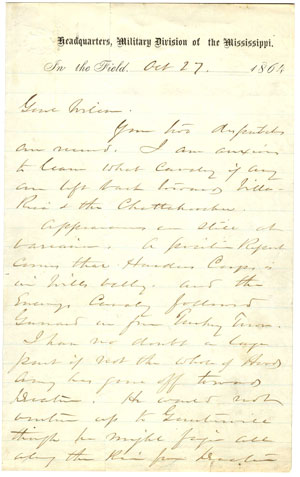 |
Sherman, William Tecumseh (1820-1891) Union general famous for his scorched-earth tactics. Autograph letter signed ("W.T. Sherman"), 2 pages, recto & verso, on blue lined Headquarters, Military Division of the Mississippi, In the Field stationery, Mississippi, October 27, 1864. To Genl Wilson [James Harrison Wilson] (1837-1925). After serving under McClellan, Wilson returned to the Western Theater and Grant's army in 1864. He became one of the few Union commanders to defeat Confederate cavalier Nathan Bedford Forrest in battle, at the Battle of Franklin in November 1864. Wilson ended the war with his men capturing both Confederate President Jefferson Davis and Andersonville Prison commandant Henry Wirz. Sherman, while deep in enemy territory without a line of communication to friendly territory, and anxious about the mood and locations of the rebel forces, especially those of John Bell Hood, writes Wilson for much needed tactical information for his eventual march to the sea:
"Your two despatches are received. I am anxious to learn what Cavalry if any are left back towards Villa Rica & the Chattahoochee. Appearances are still at variance. A position report comes that Hardee's Corps is in Willis Valley, and the Enemy's Cavalry followed Gerard in from Turkey Town. I have no doubt a large part if not the whole of Hood's army has gone off towards Decatur. He would not venture up to Guntersville though he might feign all along the River from Decatur to Gunters. I hardly think he would give so much publicity to a movement into Tennessee. Still Hood is capable of undertaking anything. Find out if you can if the Enemy has a Comm. Line on the road from Newnan Georgia via Villa Rica, Cedartown, Jacksonville, Gadsden, etc. I would like you to hit some…of the Cavalry a good bit if they will stand, for you can judge if they cover anything like a depot of stores at River Mountain. I ordered Schofield to send a Brigade of Light Infantry out some 5 miles tomorrow morning." Age toned. Slight separation at top of vertical fold. Glue remnants along right edge verso. With a printed portrait photograph of General Sherman, black & white, 5 x 3¼ in.
Estimated Value $3,000 - 5,000.
View details and enlarged photos
| Realized
$5,040 |
Lot 340 |
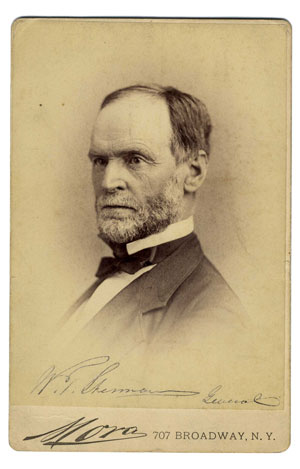 |
Sherman, William Tecumseh. Cabinet photo signed ("W.T. Sherman/ General"), 6½ x 4¼ in. (5¾ x 4 1/8 in. image on mount), no place, no date. Imprint of Mora, 707 Broadway, N.Y. on the mount.
Estimated Value $1,200 - 1,500.
View details and enlarged photo
| Realized
$750 |
Lot 341 |
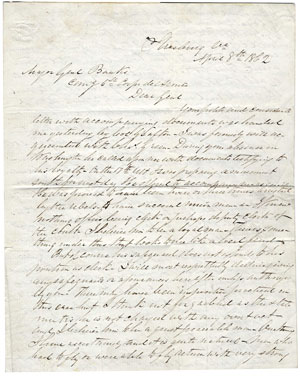 |
Shields, James (1806-1879) American politician and U.S. Army Civil War General. In 1842 Shields, while the Illinois State Auditor, almost fought a duel with Abraham Lincoln due to an inflammatory letter Lincoln had published in a Springfield, Illinois, newspaper. Letter signed ("Jas. Shields / Brig. Genl."), 3 pages, recto & verso, bifolium, 10 x 7½ in., Strasburg, Virginia, April 8, 1862. To Major Genl. N. [Nathaniel] P. Banks (1816-1894). The General comments on the loyalty of a local man and then considers how the Union army should act as a political force among the people of Virginia by outlining some general rules to be followed by Banks for the occupation of Virginia.
In part: "…he called upon me with documents testifying to his loyalty…There is something under this that looks to me like a local feud…The government as you know has released all held captive for their political opinions. This measure is very distasteful to those behind who aided in their arrest. This too is natural…we have come to destroy your armies and overthrow your government but not to interfere with your people if they do not interfere with us…whenever a Union man was expelled from his house or kept away from his home or threatened by his neighbors to arrest such persons…with regard to the prisoners in [Stonewall] Jacksons hands captured for Union sentiments…let them know that I would recommend reprisals…I have taken the liberty of going more at length into this matter because I feel that now as Head of this Dept a very delicate duty will devolve upon you, and one from which I beg leave…1st …security to be given to loyal citizens in all parts of your dept. without instituting enquiries or promoting recriminations, amongst neighbors fot the past/ 2nd Full security…to all who will pursue their usual avocations / 3rd…noninterference of military power with the courts of justice…civil functionaries until required by the constituted authorities…/ 4th…recovery of the captives for opinion taken in the hands of Jackson. / 5 The course to be pursed with regard to negros who go between our lines and are claimed by their masters…The rules I think ought to be general…"Age toned. Vertical & horizontal folds. Minor mounting remnants on last page.
Estimated Value $600 - 800.
View details and enlarged photos
| Realized
$180 |
Lot 342 |
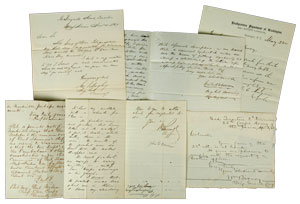 |
Six Union Generals. Six items signed by six Union generals: James Scott Negley ALS ("Jas. S. Negley"), 1 page, 9¾ x 7¾ in., Pa. Brigade Head Quarters, Camp Nevin, Nov. 4, 1861, to an unidentified recipient about obtaining supplies: "The Secy of War telegraphed me that my requisition for ordnance stores would be shipped to your care. Have they arrived? I sent a requisition…for coals medicines &c which we need very much. Our forge has been stopd for want of coals."
George Maxwell Robeson ALS ("Geo. M. Robeson"), 2½ pages, 9¾ x 7¾ in., Headquarters Camp Cadwalader, Beverly, N.J., Aug. 26, 1862, to Gen. R.F. Stockton, reporting "I have received, and established in Camp, five full companies and three parts of companies." He has organized some of the companies by electing their commissioned officers and will organize the others the next day. "I suggest that the commissions be sent me, with instructions not to deliver them until the regiment is organized, in order that if any officer shouldmissbehave himself, his misconduct may be reported through you to the Commander in chief & the commission returned if thought proper…."
John Gross Barnard ALS ("J.G. Barnard"), 2¼ pages, 8 x 5 in., Washington, June 29, 1863, to Messrs. Richardson, Spears & Thompson, asking that they make him a pair of summer flannel pants with pockets that buttoned, not after the French fashion, which previously caused him to lose his wallet and a $300 check.
John Milton Brannan ALS ("J.M. Brannan"), 2 pages, 8 x 5 in., Department of the Cumberland, Eastport, Miss. Jan. 20, 1865, to Bvt. Maj. Gen. Wilson, agreeing to "'Horse' Bainbridge's battery, also the regular Company belonging to the Army of the Tennessee now at Nashville….Genl Webster & the remainder of Genl Sherman's staff are ordered to Savannah &…the two Depts. of the Cumberland & Ohio consolidated under the command of Genl Tlhomas. Fort Fisher has fallen…."
William Birney ALS ("Wm Birney"), 1 page, 6¼ x 7¾ in., Head Quarter, 2d Division, 25th Corps, Army of the James, April 2, 1865, to an unidentified recipient: "…It gives me pleasure to comply with the request of a brother officer."
Christopher Columbus Augur ALS ("C.C. Augur"), 1 page, 9¾ x 7½ in., Headquarters Department of Washington, 22d Army Corps, Washington, D.C.,May 22, 1865, to Mr.(Gustavus) Fox, Asst. Sec. of the Navy, enclosing sixty cards from stand No. 1 for use of the Navy Dept…." (6 items).
Estimated Value $1,000 - 1,500.
Christie's New York, June 9, 2004, lot 342.
View details and enlarged photo
| Realized
$576 |
Lot 343 |
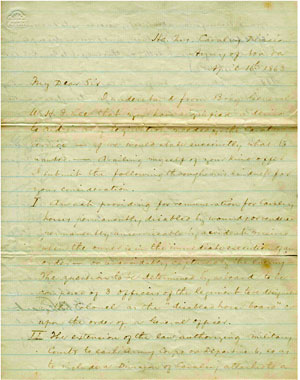 |
Stuart, James Ewell Brown "Jeb". Autograph letter signed ("J.E.B Stuart") as Major General Commanding, 2 pages, 10 x 7¾ in., "Hd. Qrd. Cavalry Division Army of Nor. Va.," April 16, 1863. To Hon. M.R.H. Garnet in the C.S. House of Representatives and hand delivered by General Robert E. Lee's oldest son, Gen. W.H.F. "Rooney" Lee. Stuart gives the Confederate Congress his ideas on improving the Cavalry service:
"I understand from Brig. General W.H.F. Lee that you have signified a desire to aid in any legislation needed for the Cavalry service - if we would state succintly what is wanted. Availing myself of your kind offer I submit the following through his kindness for your consideration. An Act providing for remuneration for Cavalry horses permanently disabled by wounds or rendered permanently unserviceable by accident received when the owner is in the immediate execution of an order - or unavoidably captured by the enemy. The extension of the law, authorizing military courts, to each Army Corps or Department, so as to include a Division of Cavalry attached to a grand army - absolutely necessary to ensure speedy trial and justice, and preserve discipline. (see copy of urgent letter on this subject to Gen. R.E. Lee, April 9th, 1863). A Veterinary Surgeon to each Brigade of Cavalry, to be selected and appointed after thorough examination into his qualifications, with the rank of Major. The amount of saving in horse flesh to the Confederacy by a competent Veterinary Surgeon to each Brigade would be incredible. I assure you that no greater service could be rendered the cavalry of the Provisional Army than the passage of such laws as embrace the foregoing…."
Stuart likely drafted this letter, reread it a time or two for corrections, then signed in slightly darker ink. This is possibly the only known J.E.B. Stuart field letter addressed to the Confederate Congress in private hands. It was purchased from the descendants of a Union soldier who had captured it during the Fall of Richmond in 1865. Text is light but legible; minor edge splits.
Estimated Value $16,000 - 20,000.
View details and enlarged photos
| Realized
$7,200 |
Lot 344 |
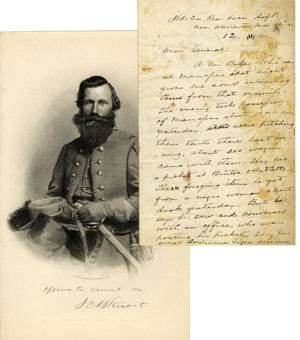 |
Stuart, James Ewell Brown "Jeb" (1833-1864) Confederate general. War-date autograph letter signed ("J.E.B. Stuart") as Brigadier General Commanding, with postscript initialled ("JEB"), 2¼ pages, 7 x 4½ in, "Hd. Qrs. Rear Forces A[rmy] of P[otomac], Near Warrenton [Virginia]," March 12, 1862. To "Dear General" (Joseph E. Johnston was in command of the Army of the Potomac at this time] reporting on information obtained by his spies: "A Mr. Baker who was at Manassas last night gives me some interesting items from that vicinity. The enemy took possession of Manassas about 10 or 11 a.m. yesterday and were pitching their tents there last evening, about 300 wagons cam with them. They had a picket at Bristol & Catletts. The foregoing items he got from a negro woman about dusk yesterday but he says he saw and conversed with an officer who was posting his pickets. They had several Louisiana Tigers prisoners whom they interrupted continuing the burning. Mr. Baker says he saw Tents around the Lewis house about sundown. He heard their pickets were at Groveton. I sent a scout down the road today to see if there was any force in motion this way. Mr. Baker says he lives near Salem & went into the Yankee lines thinking they were ours till he saw the negro woman he'd referred to. Many tents were visible about Centreville. In haste Yours truly…." Staining to first and last (blank) page.
The movements reported to Stuart were at the beginning of the Peninsula Campaign, a major Union operation launched in southeastern Virginia from March through July 1862 and commanded by Maj. Gen. George B. McClellan, with the objective of capturing the Confederate capital of Richmond. In March 1862, Stuart was given command of all the cavalry brigades in what would soon become the Army of Northern Virginia, renamed from Army of the Potomac two days after Stuart wrote this letter. On May 31, 1862, General Johnston was severely wounded at the Battle of the Seven Pines and on June 1, 1862, General Robert E. Lee assumed command of the Army of Northern Virginia.
Estimated Value $12,000 - 15,000.
View details and enlarged photos
| Realized
$7,500 |
Lot 345 |
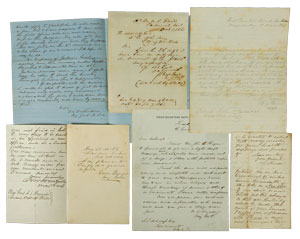 |
Tennessee-Kentucky Theater of War - Seven Generals. William R. Terrill ALS ("Terrill"), 3 pages, 7½ x 5 in., New Port Bks, Ky, Sept 21, 1861, to (George S.) Greene: "I want men men. Dont put me into battle till I get men to serve my guns….My collars are all too small and I find I can get more made for Fremont has engaged the town, but I will have mine cut. I hope you will get along some how if you are attacked, but I dont see how….Today I tramped over the city asking every able bodied man I saw if he wanted to enlist…" More content. Terrill would die at the Battle of Perryville (Oct. 8, '62). William Nelson ("W. Nelson"), 1 page, 10 x 7 3/4 in., Head Quarters Camp Kenton, Maysville, Ky., Oct. 3, 1861, to Col. (Joshua W.) Sill: "Affairs are coming to a crisis in this region with an accelerating rapidity. The body of the people appear to be panic stricken. If you can move your regiment here, pray do so. Confidence must be restored here at once. The enemy are closing over to Camp Dick Robinson and I am urging everything to raise men to move to Genl Thomas' assistance. I have everything but men…." Charles F. Smith ALS ("C.F. Smith"), 1 page, 8 x 6¼ in., Hd. Qrs, U.S. Forces, Paducah, Ky., to Asst. Adj. Genl, Hd. Qrs. of the Army, City of New York: "Since the 8th inst. I have been on duty here in command of the post." Thomas C. Crittenden ALS ("T.L. Crittenden"), 2 pages, 10 x 7¾ in., Brigade Head Quarters, Calhoun, Ky Nov. 7, 1861, to Gen. W.T. Sherman: "One of my scout brings the intelligence that the force at Hopkinsville has been augmented by the addition of a Tennessee Regt: and probably one Mississippi Regt. The scout is a very intelligent man…He says there are now 5000 men at Hopkinsville. I think not so many….I would be glad to know if Genl: McCooks Column will make any movement & when. With the force I will soon have I might materially aid him by moving first." William S. Rosecrans ALS ("W.S. Rosecrans"), 1 page, 9¾ x 7¾ in., Head Quarters Dept of the Cumberland, Mar. 28, 1863, to S.S. Ashcraft, saying he is sending a man to Cincinnati "to get me a light draft Messenger boat, which he will have made out of a barge, & fitted with portable engine and armament. I wish this done with all possible secrecy…." Alexander McDowell McCook ALS ("A McD McCook"), 2 pages, 8 x 5 in., Murfreesboro, Tenn., April 16, 1863, to Maj. Gen. Burnside, introducing by letter Col. E.A. Parrott, the new Provost Marshal of Ohio: "I am well aware of the responsibilities of his office and the great necessity of hearty cooperation of officials in putting down this accursed rebellion…." Gordon Granger ALS, 1 page, 8 x 5 in., Head Qrs 4th A.C., Loudon, E. Tenn., sending his autograph to an unnamed recipient. (7 items).
Estimated Value $2,000 - 3,000.
View details and enlarged photo
| Realized
$2,750 |
Lot 346 |
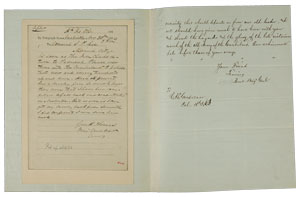 |
Thomas, George (1816-1870) Union General, called "The Rock of Chickamauga"; he was given the Thanks of Congress for his actions at Franklin and Nashville. Autograph telegram signed ("Geo H. Thomas") as Major General Commanding, 1 page, 8 x 5¼ in. on telegraph stationery, Hd Qrs D[epartment] C[umberland], Nashville, 3 P.M., Nov. 30, 1864. Instructions to "Cypher" at top left. To Admiral S.P. Lee: "As soon as the Ironclads return to Paducah. Please order them into the Cumberland to patroll that river and covoy transports up and down. Hood at present has a cavalry force so much larger than mine that I have been compelled to fall back and concentrate on Nashville. But as soon as I can get my cavalry back from Louisville I feel confident I can drive him back."
At Nashville, Thomas had to organize his forces, intending to pursue Hood and destroy the Confederate army. He had been sent numerous men ("casuals") who had been with Sherman's army at Chattanooga; he also needed horses for several thousand unmounted cavalrymen; even quartermaster personnel needed to be organized into a fighting unit. On Dec. 6, General Grant (who was general-in-chief) ordered Thomas to attack Hood at once, but Thomas delayed, still hoping for horses for his cavalrymen. On the 8th, when he intended to attack, the weather turned cold, and he postponed the attack until the ice melted. Angry at the delays, Grant sent an order to replace Thomas and on Dec. 15 prepared to go west to take command himself. On the 15th, however, Thomas won a resounding victory at the Battle of Nashville, destroying Hood's command, which had been weakened by losses inflicted on them on Nov. 30 by a large part of Thomas' forces under Gen. Scholfield on the same afternoon that Thomas sent this telegram.
A second letter in this lot is an autograph letter from General Benjamin Dana Fearing signed ("Fearing"), 1½ pages, 9¾ x 7¾ in., Head Quarters 3rd Brigade 2d Division, 14th Army Corps Station No. 1. S and H. R.R. Ga, Jan. 21, 1865. To Col C.H. Grosvenoer, having heard that Grant had intended to replace Thomas and angrily defending Gen. Thomas: "We hardly do know yet how you whipped Hood so completely….There was quite an indignation when they [the 14th Army Corps] heard that Genl. Thomas was to be relieved….It would have been a venture that I do not think Gen'l Grant would ever have dared….We think much of the Genl. and no one shall step on his corns without offence….much as I admire the brilliancy and genius of Sherman, [I think] that history will give the palm to Genl. Thomas as the General who has never failed…."
Estimated Value $1,500 - 2,000.
Christie's New York, June 9, 2004.
View details and enlarged photos
| Realized
$2,520 |
Lot 347 |
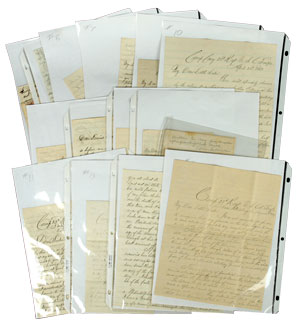 |
Townsend, Edward C. - Commander of "Colored Troops". Collection of fifteen autograph letters signed, total of 59 pages, various sizes, April 30, 1863-Dec. 15, 1877. To Marion Teall, all in pencil, with original envelopes. Edward C. Townsend, of Boston, was captain of Co. F, 152nd Regiment, NYS Volunteers, in the Army of the Potomac's 23rd Regiment. Townsend is a fervent abolitionist who looks forward to "slaughtering" the "Rebs" and who strongly expresses his love for his country. In April 1863, he describes the "Sharpshooters…firing away at each other without ceasing, Cannon and mortars are continually belching forth their flame, smoke and death but I am getting accustomed to the noise….I am not naturally bloodthirsty, but must say that I am eager for the mighty conflict to begin. Never did I feel more anxious to face the traitors than now…." On May 12, 1863, he says, "…I feel a greater determination than ever to pursue this war to the most bitter end…." Describing his thoughts before going into battle, he says, "…The soldiers idea…is simply, are his cartridges in good order, is his load on his back sufficiently light enough to admit of easy action and travel, will the Regt stand firm and give the Rebs fits - shall he succeed with his companions finally in routing the enemy and slaughtering or successfully capturing many of them."
In his May 28, 1863 letter, he describes "tearing up RailRoads, burning buildings and confiscating things generally….Yankee was too much for Reb….My policy is war to submission and then hang the leaders." On Dec. 20, 1863, he describes the soldiers' exhaustion after returning from "a severe campaign" and defends Gen. Meade from slurs about his lack of action. On April 1, 1864, he writes exuberantly of having received a commission as a captain in a colored regiment, which he will receive from Abraham Lincoln shortly. On April 17, 1864, he writes from Washington that he has his commission and a new uniform and that he has been assigned to the command of Co. I, 23rd Regt. U.S. Colored Troops. On Aug. 8, 1864, he describes "the terrible battle before Peterburg on the 30th of last month [Battle of the Crater]….our losses were very heavy and the whole piece of Grant's splendid strategy, proved a miserable failure. There are plenty of fanatical and prejudiced minds who …blame the Colored Troops and without the faintest tinge of reason or justice. The Colored Troops to which I belong as an officer made a splendid and successful charge….the affair turned out poorly, but any individual who asserts that our Division is accountable for this disaster--or that the Col. Div. men did not fight well, I am fully prepared to say…that they fling forth a most contemptable calumny…to speak plain English, they tell infamous lies."
On April 18, 1865, he tells Marion, "We have all had our hearts gladdened by the fall of Richmond and the surrender of Gen'l Lee, but a gloom…has now fallen with keen and crushing weight upon this whole nation: Abraham Lincoln, our most honored and esteemed President has gone to his final rest, and that by the hand of an assassin….To day, the President's remains are laid out in state, and I shall take a farewell look at his noble features….Never before did I shed tears over the death of a public man, but the flood would come this time, and I was no exception, for hundreds and thousands of men, strong men who had not wept for years broke down with sobs and deep emotion over the news of our President's death….the manner of his death will fire the hearts and courage of the American people, and now, woe be to those who laugh at his death, or who shall dare to proclaim the least amount of sympathy for rebels…."
Estimated Value $1,500 - 2,500.
View details and enlarged photo
| Realized
$2,160 |
Lot 348 |
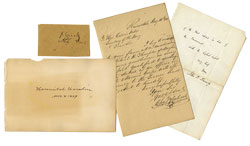 |
Two Maryland Letters to Gideon Wells & Two Lincoln Cabinet Officers. Two autograph letters signed, both addressed to Secretary of the Navy Gideon Wells, and both highly recommending Robert H. Thompson for a position as an officer in the Marine Corps. John P. Kennedy (1795-1870) a Whig politician who served as United States Secretary of the Navy under Millard Fillmore (1852-1853), and as a U.S. Representative from the Maryland's 4th congressional district (1838-39), wrote on Aug. 14, 1861, and Charles Benedict Calvert (1808-64), a U.S. Congressman from the sixth district of Maryland, wrote on Aug. 1, 1861. Total of 4 pages, 8 x 5 in. Together with a toned 5 x 7½ in. album page signed and dated by Lincoln's first Vice President, "Hannibal Hamlin / May 8 1889"; also, a 2¼ x 3½ in. piece of paper signed "J. Speed / Atty. Genl." Speed served as Lincoln's Attorney General from December 1864 to July 1866.
Estimated Value $250 - 300.
View details and enlarged photo
| Realized
$188 |
Lot 349 |
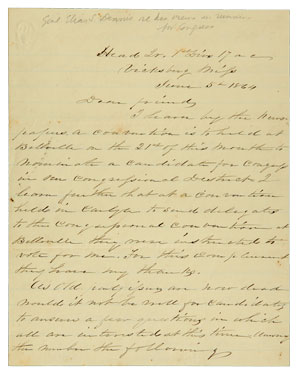 |
Two Union Generals Re Election of 1864. Elias S. Dennis ALS, 2 pages, 9¾ x 7¾ in., Head Qr. 1st Div., 17 a c, Vicksburg, Miss., June 5, 1864. A campaign letter from Dennis, who had been a member of the Illinois House and Senate before serving in the war, where he reached the rank of brevet major general. He writes after learning that he has been nominated as a Congressional candidate for Carlyle, Illinois: "As old party issues are now dead would it not be well for candidates to answer a few questions…1 Are you in favour of the prosecution of the war for the restoration of the National Authority? 2 Will you if elected to Congress vote men and money to prosecute the war with vigor? 3d Will you…vote for an amendment to the Constitution to be submitted to the States for ratification prohibiting slavery throughout the Country? 4 Are you in favour of suppressing the rebellion at every cost and at all hazards? I will answer to all of the above….I will swear as did Old Hickory 'By the Eternal the Union must and shall be preserved'."
John A. Dix ALS, 2 pages, 8 x 5 in., New York, Oct. 15, 1864, to Hon. John W. Edmonds, thanking him for his letter. "…I hope it will make people think, and by a careful review of the past, suggest remedies for existing evils. We must have a re-organization of the democracy. Its present leaders lack sagacity, disinterestedness and courage; and without these there can be no bold or manly action in regard to great public questions."
How to end the war was the biggest issue of the election of 1864. Groups such as the "Copperheads" wanted peace, no matter the cost. On the issue of slavery, McClellan, who was the candidate of the Peace Democrats, and many Northern voters, thought Lincoln's Emancipation Proclamation was too radical. Heavy Union losses also generated discontent, but when Sherman seized Atlanta on September 6, 1864, everything changed.
Estimated Value $1,000 - 1,250.
View details and enlarged photos
| Realized
$1,800 |
Lot 350 |
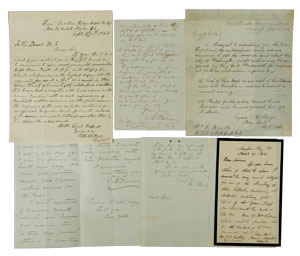 |
Virginia Theater, Army of the Potomac - Six Union Generals. Six items signed by six Union generals: Alpheus S. Williams ALS ("A. Williams"), 2 pages, 8¼ x 5¼ in., Head Qrs. 3d Brigade, Bunker Hill, Ma., Mar. 6, 1862, to Gen. Hamilton during Stonewall Jackson's spring 1862 campaign through the Shenandoah Valley: "…the route to W[inchester] is strongly fortified. The slopes of the mountains which run parallel to the W. pike are dug with rifle pits, & there is a battery or an earth works which commands the road. They can be turned I think four miles from this…My impression is…that Jackson intends to make a stand at W. If the thing is properly managed we can make a great point…."
Samuel D. Sturgis ADS ("S.D. Sturgis"), 1 page, 9½ x 8 in., Head Quarters Reserve Army Corps, Washington, June 11, 1862, to Wm. C. Rawolle, A.D.C. &c Ass't Insp Gen'l. General Orders No. 1: "Pursuant to instructions from the War Department, the undersigned hereby assumes command of all the forces in and about the city of Washington, except such as may be required by Brig. Gen'l Wadsworth….Such of these troops as are north of the Potomac will hold themselves in readiness to move at a moments warning." Mounting remnants on verso.
Robert H. Milroy ALS ("R.H. Milroy"), 1 page, 9¾ x 7¾ in., Head Quarters Milroy's Indpt. Va. Bgd, Neat Ft. DeCalb Alxr Co., Va., Sept. 27, 1862, to the President (Abraham Lincoln), recommending Capt. Donn Piatt for a position as Brig. Gen.: "Plenty of brains - highly intellectual & cultivated. brave cool & energetic with heart & soul in the cause…"
Henry Jackson Hunt ALS ("H.J. Hunt"), 1½ pages, Office of Chief of Artillery, Army of the Potomac, Feb. 2, 1863, to Gen. Sprague: "McMahons battery is going to the dogs for want of a man….I recommend Patrick Hart [who] was the driver of my howitzer at the Garita San Cosme and…is the best man I know for the position…."
Frank Wheaton ALS, 1 page, 8 x 5 in., Harpers Ferry, Va., Feb. 27, 1864, to Senator H.B. Anthony: "…I would be very much obliged for one of the Secretary of Wars Reports…One of McClellans reports and…two of the Conduct of the War reports."
Seth Williams ALS ("S. Williams"), 3 pages, Head-Quarters, Army of the Potomac, Mar. 11, 1864, to Sidney Webster, sending signatures (not present) of Generals Grant, Meade, and Ingalls for the Fair. The U.S. Sanitary Commission held fairs to raise funds to support sick and wounded Union soldiers. In 1864 President Lincoln signed a limited edition run of 48 copies of the Emancipation Proclamation, to be sold for $10 each at the Philadelphia Sanitary Fair, the funds to be used to hire nurses, buy medication, etc. (6 items).
Estimated Value $1,500 - 2,000.
Christie's New York, June 9, 2004, lot 346.
View details and enlarged photo
| Realized
$900 |
Lot 351 |
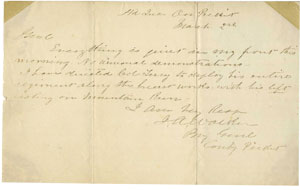 |
Walker, James A (1832-1901) Confederate general; nicknamed "Stonewall Jim." Autograph letter signed ("J.A. Walker") as Brig. Gen. Comdg Picket, 1 page, 5 x 8 in., Head Quarters on Picket, March 2, no year. Reporting from the picket line: "Everything is quiet in my front this morning. No unusual demonstrations. I have directed Col Terry to deploy his entire regiment along the breast works, with his left resting on Mountain Run." Walker participated in nearly every action of the II Corps of the Army of Northern Virginia. He led a regiment at Second Bull Run, and a brigade at both Antietam and Fredericksburg, was wounded at Antietam, and again at Spottsylvania. He later served two terms as a United States Congressman. Mounting remnants at corners.
Estimated Value $800 - 1,000.
Christie's New York, June 9, 2004, lot 347.
View details and enlarged photo
| Realized
$240 |
|
|